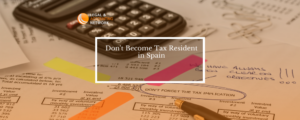Tax inspections in Spain can be a complex process for businesses and individuals. It is crucial to understand the different types of inspections, such as general audits and partial audits. Preparation is key, including verifying tax compliance and reviewing documentation. Seeking expert advice from legal and tax professionals is essential. Strategies for dealing with inspections involve cooperation with tax authorities, negotiation, and proactive measures to safeguard interests. Specific considerations exist for companies and self-employed individuals, requiring compliance and reporting. Additional services, such as tax consultants and accounting support, can help streamline tax processes. Stay updated on recent developments and changes in Spanish tax law.
Understanding the Different Types of Tax Inspections
When it comes to tax inspections in Spain, it is important to have a clear understanding of the different types that can occur. These inspections are carried out by the Spanish Tax Office, and they play a crucial role in ensuring compliance with tax regulations and detecting any potential irregularities. By understanding the different types of tax inspections, individuals and businesses can better prepare themselves and navigate the process effectively.
General Tax Audits: What You Need to Know
One type of tax inspection is a general tax audit, which involves a comprehensive review of an individual’s or company’s financial records, tax returns, and relevant documentation. These audits aim to assess the accuracy and completeness of the reported information and identify any discrepancies or potential tax evasion. During a general tax audit, the tax authorities may request additional information, interview relevant parties, and perform on-site visits to verify the reported data.
It is important to note that general tax audits are not initiated based on suspicion of wrongdoing but are instead conducted as part of routine tax enforcement measures. Individuals and businesses selected for a general tax audit should ensure they have all the necessary documents and records in order and be prepared to cooperate with the tax authorities throughout the process.
Partial Tax Audits: Key Considerations
In addition to general tax audits, the Spanish Tax Office also carries out partial tax audits on specific aspects or areas of an individual’s or company’s tax obligations. These audits focus on specific tax types, transactions, or periods. The aim is to thoroughly examine those areas that have a higher risk of non-compliance or discrepancies.
During a partial tax audit, individuals or businesses may be required to provide detailed information and supporting documents relating to the specific tax issue under review. The tax authorities may also conduct interviews and perform relevant investigations to ensure compliance in the identified areas. It is crucial for individuals and businesses to be prepared, have proper documentation in place, and cooperate with the tax authorities during a partial tax audit.
In summary, understanding the different types of tax inspections, including general tax audits and partial tax audits, is essential when it comes to dealing with tax obligations in Spain. By being aware of the specifics of each type of inspection, individuals and businesses can ensure they are adequately prepared and address any potential issues in a timely and compliant manner.
Key Steps to Prepare for a Tax Inspection
Preparing for a tax inspection in Spain requires careful attention to detail and adherence to legal and financial requirements. By taking the following key steps, you can ensure compliance, review necessary documentation and accounting records, and seek expert guidance to navigate the complexities of a tax inspection:
Verifying Your Tax Situation: Ensuring Compliance
Before a tax inspection commences, it is crucial to verify your tax situation and ensure compliance with all applicable regulations. This involves reviewing your tax returns, declarations, and payments, cross-referencing them with relevant tax laws. Conducting an internal audit can help identify any discrepancies or potential areas of concern. If any issues are detected, it is advisable to address them promptly to rectify any potential non-compliance before the inspection.
Reviewing Documentation and Accounting Records
Thoroughly reviewing your documentation and accounting records is essential in preparing for a tax inspection. Ensure that all relevant financial records, such as invoices, receipts, banking statements, and expense reports, are organized and readily accessible. Cross-check these records with your tax returns and other financial documents to ensure accuracy and completeness. Additionally, maintaining proper accounting practices and record-keeping throughout the year can simplify the review process during an inspection.
Seeking Legal and Tax Advice: Expert Guidance
Engaging the services of legal and tax professionals with expertise in tax inspections can provide invaluable guidance and support. These experts can help you understand the intricacies of tax laws, interpret regulations relevant to your business or personal tax situation, and offer advice specific to your circumstances. They can also assist in structuring your responses to queries from tax authorities and represent you during the inspection process, ensuring that your rights are protected and that you present a comprehensive and compliant approach.
By following these key steps, you can proactively prepare for a tax inspection in Spain, promote compliance, and mitigate potential risks. Taking the time to verify your tax situation, review documentation and accounting records, and seek expert advice will enable you to navigate the inspection process smoothly and confidently.
Strategies for Dealing with a Tax Inspection
When facing a tax inspection in Spain, it is crucial to adopt effective strategies to navigate the process smoothly. By following these key approaches, both businesses and individuals can ensure compliance and protect their interests.
Cooperation and Communication with Tax Authorities
One of the fundamental strategies for handling a tax inspection is to maintain a cooperative and open line of communication with the tax authorities. Responding promptly to inquiries and providing requested documentation can help build trust and establish a positive rapport. By demonstrating a willingness to collaborate, it becomes easier to address any potential discrepancies or concerns flagged by the tax authorities.
Negotiating Agreements and Resolutions
During the tax inspection process, opportunities for negotiation may arise. It is essential to leverage these moments to reach mutually agreeable resolutions. Skilled negotiation techniques and a thorough understanding of tax legislation can be invaluable in minimizing potential penalties and liabilities. Seeking professional guidance from legal and tax advisors can significantly enhance negotiation outcomes.
Proactive Measures to Protect Your Interests
Taking proactive measures to safeguard your interests is essential throughout the tax inspection process. This involves closely monitoring and reviewing all financial and accounting records to ensure accuracy and compliance. Regular internal audits and ongoing compliance checks can help identify and rectify potential issues before they escalate. Seeking legal advice and guidance can further assist in developing effective strategies tailored to your specific situation, ensuring optimal protection of your interests.
By adopting a cooperative approach, leveraging negotiation opportunities, and implementing proactive measures, businesses and individuals can effectively deal with tax inspections in Spain. These strategies foster a transparent and collaborative relationship with tax authorities while safeguarding your legal and financial interests.
Specific Considerations for Companies and Self-Employed Individuals
The tax inspection process entails specific considerations for both companies and self-employed individuals in Spain. It is essential to understand the compliance and reporting obligations related to corporate tax inspections and personal income tax inspections.
Corporate Tax Inspections: Compliance and Reporting
Corporate tax inspections require companies to demonstrate compliance with tax regulations and accurately report their financial information. When facing a corporate tax inspection, companies should:
- Ensure proper record-keeping of accounting documents and financial statements
- Review the accuracy of their tax calculations and payments
- Verify the validity of deductions, allowances, and exemptions claimed
- Cooperate with tax authorities during the inspection process
- Seek expert advice from tax consultants or legal advisors
Companies should also be aware of recent changes in Spanish tax laws that may impact their corporate tax obligations. By staying up-to-date with these changes, companies can adapt their compliance strategies accordingly.
Personal Income Tax Inspections: Rights and Obligations
Self-employed individuals undergo personal income tax inspections to ensure their compliance with tax laws. When facing a personal income tax inspection, it is important to understand the rights and obligations involved. Some key considerations include:
- Preparing accurate and complete income tax returns
- Keeping proper documentation to support income and expense claims
- Cooperating with tax authorities and providing requested information
- Knowing and exercising rights, such as the right to legal representation
- Seeking advice from tax professionals to navigate the inspection process
Self-employed individuals should remain updated on any changes in Spanish tax laws that may impact their personal income tax obligations. This allows them to fulfill their tax responsibilities and mitigate potential issues during inspections.
Additional Services and Support for Tax Obligations
In addition to understanding the key steps and strategies for dealing with tax inspections, businesses and individuals can benefit from various services and support to ensure compliance with their tax obligations. This section explores two important aspects: tax consultants and legal advisors, and accounting services.
Tax Consultants and Legal Advisors: Maximizing Compliance
When facing tax inspections, it can be highly beneficial to seek guidance from tax consultants and legal advisors who specialize in Spanish tax law. These professionals have in-depth knowledge and experience in dealing with tax authorities, ensuring that clients’ rights and interests are protected throughout the process.
Tax consultants and legal advisors offer a range of valuable services. They can help businesses and individuals review their tax situation, identify any potential compliance issues, and develop strategies to address them. Moreover, they can provide valuable insights into applicable regulations, keep clients informed about changes in tax laws, and assist with effective tax planning.
Having a dedicated professional by your side during a tax inspection can alleviate the stress and uncertainty that often accompany such processes. Tax consultants and legal advisors can represent clients in negotiations with tax authorities, ensure that all necessary documentation is prepared and presented correctly, and help clients navigate complex legal and procedural requirements.
Accounting Services: Streamlining Tax Processes
Accurate and timely accounting is crucial for successful tax compliance. Engaging accounting services can provide businesses and individuals with the necessary support to streamline their tax processes and ensure accurate reporting.
Accounting professionals can handle various aspects of tax obligations, such as maintaining proper records, preparing financial statements, and managing payroll. They have a deep understanding of accounting principles and tax regulations specific to Spain, ensuring that all financial data is recorded in compliance with applicable standards.
By outsourcing accounting services, businesses and individuals can focus on their core activities while ensuring that their tax obligations are met. Accounting professionals can help identify potential tax deductions, optimize tax filing procedures, and ensure that all necessary forms and reports are submitted correctly and on time.
- Assistance with financial recordkeeping and documentation
- Expertise in tax regulations and compliance requirements
- Optimization of tax planning and reporting processes
- Support in preparing and submitting tax forms and reports
- Timely updates on changes in tax laws and regulations
Overall, tax consultants and legal advisors, along with accounting services, play vital roles in assisting businesses and individuals throughout tax inspections. Their expertise and support can help maximize compliance, minimize risks, and ensure peace of mind when dealing with complex tax obligations in Spain.
Recent Developments and Updates in Spanish Tax Law
Keeping up with recent developments and updates in Spanish tax law is crucial for individuals and businesses to ensure compliance with the ever-changing regulations. This section highlights the impact of recent changes on tax inspections and reporting, as well as the importance of adapting to new regulations to ensure compliance.
Impact of Changes on Tax Inspections and Reporting
Recent changes in Spanish tax law have had a profound impact on tax inspections and reporting procedures. Tax authorities have implemented stricter measures to detect non-compliance and tax evasion, making it more important than ever for individuals and businesses to maintain accurate and transparent records.
With the introduction of new technologies and digitalization, tax inspections now heavily rely on data analysis and cross-referencing information from various sources. This has resulted in a more efficient and targeted approach to detect irregularities and discrepancies in tax reporting.
Failing to comply with these changes can lead to severe penalties, fines, and even legal consequences. It is essential to stay informed about the latest requirements and ensure proper documentation and reporting to avoid potential issues during tax inspections.
Adapting to New Regulations: Ensuring Compliance
To ensure compliance with recent changes in Spanish tax law, individuals and businesses must proactively adapt to new regulations and requirements. Here are some key considerations:
- Stay updated: Regularly review official communications, publications, and announcements from tax authorities to stay informed about any changes or updates in tax regulations.
- Seek professional advice: Engage the services of experienced tax consultants or legal advisors who can provide guidance on interpreting new regulations and assist in adapting tax strategies accordingly.
- Evaluate internal processes: Assess and update internal processes and systems to ensure accurate data collection, record-keeping, and reporting in compliance with the latest regulations.
- Invest in technology: Embrace digital tools and software that can streamline tax-related processes, facilitate data analysis, and enhance compliance with evolving tax laws.
- Training and education: Provide necessary training to employees, including finance and accounting teams, to ensure they are up to date with the latest tax regulations and understand their roles in maintaining compliance.
By adapting to new regulations, individuals and businesses can navigate tax inspections more confidently, reduce the risk of non-compliance, and safeguard their financial interests.







